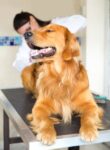 Anal glands are found in dogs and cats. They are not very important to the animal nowadays. They used to be used for scent marking out in the wild, so it would help protect their domain, warn off other dogs, that kind of thing. Nowadays, dogs are mostly owned, so they do not need them for that purpose. But they do cause quite a lot of problems, especially in dogs.
Anal glands are found in dogs and cats. They are not very important to the animal nowadays. They used to be used for scent marking out in the wild, so it would help protect their domain, warn off other dogs, that kind of thing. Nowadays, dogs are mostly owned, so they do not need them for that purpose. But they do cause quite a lot of problems, especially in dogs.
If you have had a bout of diarrhoea, you will find, in some cases, that your dog’s anal glands will fill up. What should happen is every time your dog passes faeces, the faeces coming through the colon should just press on the anal glands and they should empty every time. You will not notice that happening, there will not be a smell, it is not painful, you will not see anything different. When that does not happen, you get anal gland material building up in the anal glands, and they become very full. This causes an irritation to the dog, and you will often see that irritation because they will go round to their tail base and have a little lick or a chew around there. They may scrape their bottom along the floor, which we call scooting. And they cannot get to the anal glands because they are tucked up inside, but they are just going around where they are, and that gives you a clue that it is probably what is irritating them and that is why they are doing that chewing and scooting.
They can be infected, anal glands, so if they are left too long, fill up, and then the animal scoots along the floor and introduces infection into their anal glands, they will swell up even more and you can get abscesses in those anal glands. If that is not treated quick enough, they will often burst. And then, it is messy, it is horrible, it is painful. And we have to, we deal with that quite urgently because it could then spread. And even if you have got an abscess and it does not burst, it can push up against the colon and even push into the colon.
So anything where you get swelling or irritation around the back end, get seen by a vet, because it may well be those anal glands. What we would normally do is empty them, look at the consistency of the gland material, and treat accordingly if we thought there was a problem or an infection.
The other time that you may see anal glands fill up is in an obese dog or an obese cat. And the reason that is, is because normally, anatomically, the anal glands lay right next to the colon. When you get bigger and obese, you get fat pads. And what those fat pads do is push the anal glands out a little bit, so they are no longer in close contact with the colon, and therefore they do not empty as they should, even if your dog has normal faeces. In those cases, we end up emptying them quite regularly and trying to get the weight off as well.
In serious cases where the animal is having them emptied every week for whatever reason, whether it is because they are obese or there is something wrong with the anal glands, we can do surgery to remove those anal glands. Because like I said at the beginning, they do not really need them anymore, they are just there because they always have been. But we do not like doing surgery. There are potential complications that go with that. You are dealing with an area of the body very close to the colon, you do not want damage to the colon. So we do not, we try not to do it, but if we cannot manage the situation, then we will do surgery to remove them.


Pingback: Pet Epilepsy and the first aid treatment you need to follow
Pingback: Ear problems in pets and identifing them and treating them
Pingback: Fractures in dogs and cats and the first aid care you need
Pingback: National Association of Security Dog Users - NASDU
Pingback: What is the reason for dogs eating faeces or coprophagia